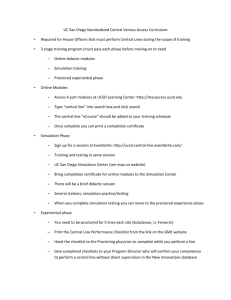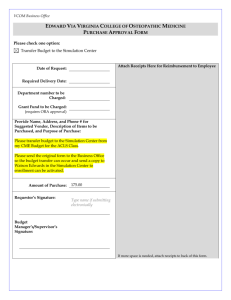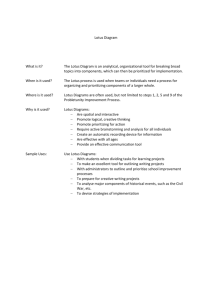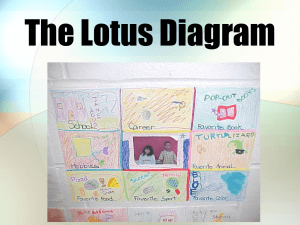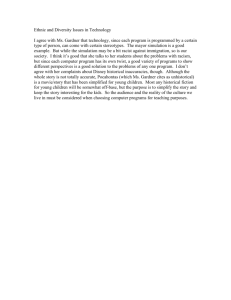MAR 6930 AB 003
advertisement
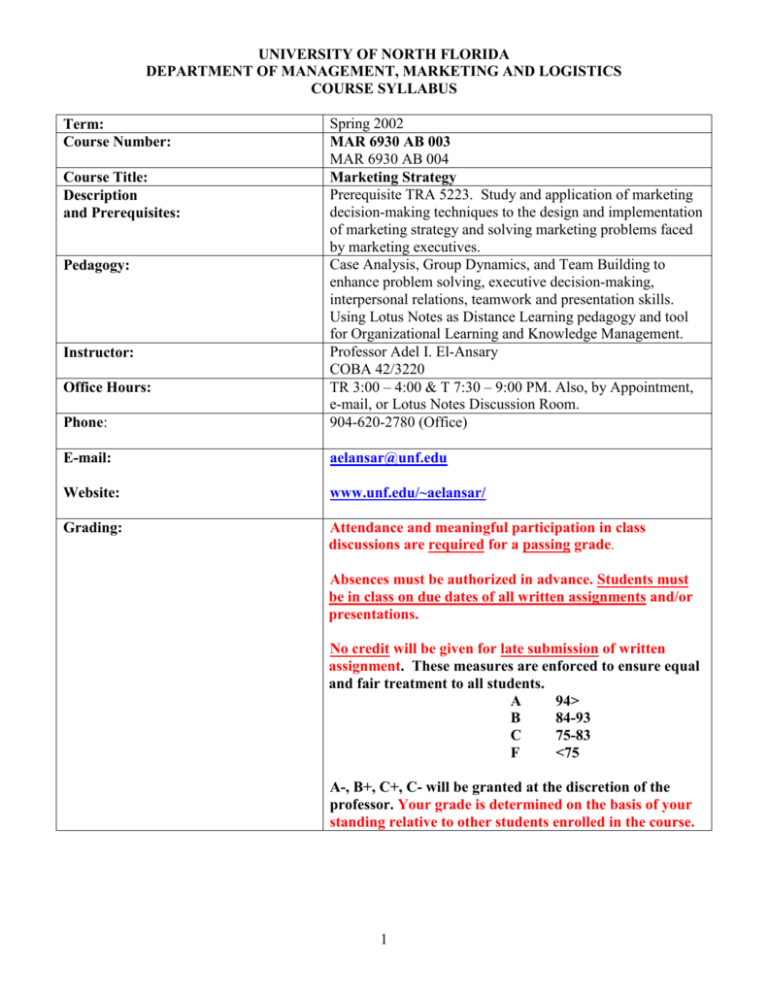
UNIVERSITY OF NORTH FLORIDA DEPARTMENT OF MANAGEMENT, MARKETING AND LOGISTICS COURSE SYLLABUS Phone: Spring 2002 MAR 6930 AB 003 MAR 6930 AB 004 Marketing Strategy Prerequisite TRA 5223. Study and application of marketing decision-making techniques to the design and implementation of marketing strategy and solving marketing problems faced by marketing executives. Case Analysis, Group Dynamics, and Team Building to enhance problem solving, executive decision-making, interpersonal relations, teamwork and presentation skills. Using Lotus Notes as Distance Learning pedagogy and tool for Organizational Learning and Knowledge Management. Professor Adel I. El-Ansary COBA 42/3220 TR 3:00 – 4:00 & T 7:30 – 9:00 PM. Also, by Appointment, e-mail, or Lotus Notes Discussion Room. 904-620-2780 (Office) E-mail: aelansar@unf.edu Website: www.unf.edu/~aelansar/ Grading: Attendance and meaningful participation in class discussions are required for a passing grade. Term: Course Number: Course Title: Description and Prerequisites: Pedagogy: Instructor: Office Hours: Absences must be authorized in advance. Students must be in class on due dates of all written assignments and/or presentations. No credit will be given for late submission of written assignment. These measures are enforced to ensure equal and fair treatment to all students. A 94> B 84-93 C 75-83 F <75 A-, B+, C+, C- will be granted at the discretion of the professor. Your grade is determined on the basis of your standing relative to other students enrolled in the course. 1 Learning Resources: Required Text Lotus Notes Modules Recommended Reference Philip Kotler. Marketing Management, Millenium Edition. Prentice-Hall, 2000. If you need to go over the principles of marketing, consult your principles of marketing textbook or see Kotler and Armstrong, Principles of Marketing, 9th edition. Prentice-hall, 2001. Concept Articulation Papers Posted on Lotus Notes Schedule and Book Reviews Posted at Media Center. Ian H. Gordon. Relationship Marketing: New Strategies, Techniques and Technologies to Win the Customers You Want and Keep Them Forever. Wiley, 1998. ISBN: 0-471-64173-1 Bill Donaldson, Tom O'Toole. Strategic Market Relationships: From Strategy to Implementation. Wiley, 2002. ISBN: 0-471-49443-7 Ian H. Gordon. Competitor Targeting: Winning the Battle for Customer Share. Wiley 2001. ISBN: 0-471-64410-2 Jagdish N. Sheth (Editor), Atul Parvatiyar (Editor) Handbook of Relationship Marketing. Sage,, 1999. Dawn Iacobucci (editor). Kellogg on Marketing. John Wiley & Sons, 2001. Cases: Discussion Cases -Harvard Business School Publishing Multimedia Cases. GE’s Two-Decade Transformation: Jack Welch’s Leadership, 2001. Building Brand Community at Harley-Davidson, 2001. Written Cases Selected From -David Cravens, et al. Strategic Marketing Cases, 7th edition. Irwin/McGraw-Hill, 2002. Marketing Plan Pro: Interactive Simulation Game: Source Web Sites: Course Requirements & Grading: www.paloaltosoftware.com Photo Wars Simulation Game. Wiley, 2001 www.unf.edu/~aelansar/ www.marketingframeworks.com www.prenhall.com/phlip I. Attendance & Participation 10% II. Book Review Power Point Presentation 10% III. Photo Wars Strategy & Results Power Point Presentations 15% IV. Written Case Analysis 40% V. Research Assignment 25% 2 Attendance & Participation I. Book Review Power Point Presentation III. Interactive Simulation Game (ISG) Simulation Game Operation Simulation Game Templates Attendance and participation include Lotus Notes Classroom Discussions and uploading of all assignments to Assignment Modules in the Schedule. Completion of all course evaluation instruments and providing feedback is mandatory! A group project. Each group will select a recently released textbook related to the Research paper Theme for the semester. The deliverable is a Power Point Presentation including: Cover Page, About the Authors, Table of Contents, Chapter-by-Chapter Detail (suitable for lecturing directly from it with built in example Websites used in the text or appendices thereof), and Conclusion reflecting your opinion of the book. See example book reviews noted in the Lotus Notes Module entitled Book Reviews. Groups of four will play the simulation game and prepare a written marketing strategy plan and result analysis report. The report will also be presented in class in the form of a Power Point presentation. For guidance in the preparation of a marketing plan see Kotler, the attached assessment sheet for marketing plan presentation, and my homepage. Use Excel to develop two templates to use as work sheets for your presentation. Template I: This template includes columns for Strategy Component (1 Column), Description of the Strategy Selected (1 Column), and How will the Strategy Selected Impact Each of the Decision Areas in the Game (5 Columns – One for each of the Decision Areas). Template II: This template includes up to 28 columns -- one column for the Decision Areas in the Simulation, 20 columns -- one for each of the 20 Quarters of Play, one Summary Column of the Common Thread and Strategy Essence of the Decisions made over the 20 Quarters for each of the Decision Areas (or Why did we make these decisions), three + columns for the final results (last quarter of the game), and one column to explain and justify the results. Supplement the Templates with graphics and figures, etc. to enhance thee presentation of game strategy, decisions, and results. Simulation Game Report Format I. Executive Summary. II. Strategy (Objectives should be specific and measurable). III. Framework for Strategy (Use the Relationship Marketing Framework or Other Comprehensive Strategy Frameworks). IV. Budget Allocation Decisions. ($ & %) V. Organizational structure realignment 3 necessary to implement the strategy (if applicable) VI. Results compared with competitors. VII. Compare results to budget allocation decisions. VIII. Future direction for the company or what would have you done differently if you are to play the game again! Power Point Presentation The strategy report and results are to be presented using a Power Point Presentation. The following page outlines evaluative criteria that will be used in the evaluation of each group as they present their simulation results. 4 Simulation Game Assessment Group #/Name -----------------I. Poor 1 2 Comments: Soundness of Strategy What is the strategy? Was the vision/mission, goals/objectives (qualitative/Quantitative) (marketing and financial), core competencies, and competitive scopes clearly stated? What is the framework for the strategy? II. Soundness of Decision–Making. Poor 1 2 Did the group address the budget allocations made? Comments: Did the group justify the allocations made according to the strategic design presented? Poor III. Analysis 1 2 Did the group explain/Provide: Comments: a. Why was this strategy selected? b. Were these decisions made according to the strategy? If not, how do you account for the tactical variations? c. Provide examples of the impact of certain decisions. Poor IV. Organizational Structure Issues. 1 2 Did the group specify the structural changes needed Comments: To Implement the strategy? V. Poor 1 Comparative Analysis Did the group compare the results with the strategic objectives set and explain these results. Did the group explain why did they achieve or did not achieve pre-set objectives? Did the group chart budget decisions against preset objectives and results achieved? VI. 2 3 4 5 6 7 8 Excellent 9 10 3 4 5 6 7 8 Excellent 9 10 7 8 Excellent 9 10 3 4 5 6 3 4 5 6 7 8 Excellent 9 10 3 4 5 6 7 8 Excellent 9 10 7 8 Excellent 9 10 7 8 Excellent 9 10 Comments: Poor 1 2 Comments: Future Direction Did the group address the future direction for the company. If they were to play the game again, would they have used different strategy? What would that be? Poor 1 VII. Overall Assessment Assess the quality of the PowerPoint presentation and delivery. 2 Comments: 5 3 3 4 4 5 6 5 6 IV. Written Case Analysis The same groups formed for the game will discuss each of the cases assigned. Thursdays - Case Update and group discussions. In addition to in-class group discussions, the students must use Lotus Notes threaded discussions to discuss and prepare for the written case analysis. Tuesdays - Submission of written case analysis and general class discussion. Written case analysis is an individual effort. Members of the group may share frameworks and general approach to case analysis developed in-group discussion. Template for written case analysis is provided in the sample case(s) in the designated Lotus Notes Module and/or Media Center. An assessment sheet of written case analysis is attached to further guide your effort. V. Research Assignment The research paper is an individual or team effort designed to integrate the key concepts of the course and update contemporary topics by focusing on Research Theme. The Research Theme for the Semester is Relationship Marketing Strategies. The papers must adhere to the format and template presented in concept articulation papers posted on Lotus Notes. 6 Guidelines for the Evaluation of Case Analysis I. Framework and Approach Did the written analysis provide an overall framework or point of view from which to conduct the analysis of the problems? II. Situation Analysis Did the analysis provide a detailed Situation Analysis? Did the analysis and recommendations flow in a consistent manner from the situation analysis? III. Problems, Analysis, and Recommendations a. Were the problem statements actual problems or were they symptoms and states of nature? b. Were the problem statements related to marketing issues? c. Did the analysis explore alternatives, specified Criteria, and articulate the consequences of these alternatives? d. Did the recommendations follow logically from the problem statements and the analysis? Were the recommendations clearly justified? IV. Implementation Did the paper have a well-defined implementation plan including action items and timeframes? 7 Calendar Subjects Text Chapter Weeks 1 & 2 I. Strategy Formulation Must Master* Marketing concepts tools & orientation Customer satisfaction, value, retention, & relationships Business, marketing, & product planning Lotus Notes Modules Lotus Notes Registration Module 1 Introduction Completion of Student Profiles Modules 2&3 1* 2* Frameworks for Problem Solving/Decision Making Week 3 Tasks &/OR Assignments Due Book Review Selection 3* Student Group Formation Simulation Game Introduction Week 4 Case Analysis Guides & Samples View How To Analyze A Case Video? Marketing decision support systems Environmental scanning & situation analysis Understanding buyer behavior/ 4 5 21 Frameworks Preface & Introduction Module 4 Strategic Drivers Modules 5&6 Corporate & Growth Strategies Module 24 Module 9 E-Strategy 6,7 Understanding competitive behavior Segmentation, Offering, Targeting strategy 8* Differentiation strategy/Positioning strategy 10* 9,11,14* Week 5 Relationship Marketing Strategies Book Reviews Book Review Power Point Presentations Week 6 HBSP Case – GE’s –Jack Welch. Read/Analyze/ Post Notes 8 Module 10 Competitive Strategy Module 7 Marketing Strategy: Tier I Module 8 Marketing Strategy: Tier II. Modules 23 & 26 Book Reviews Module 18 Week 7 HBSP Case Harley-Davidson Week 8 International market context Case # 1. II. Organization Structure Marketing Organization Week 9 Week 10 III. Strategy Implementation/Marketing Management Product /Service Technology & Innovation Total Quality Management Case# 2. Read/Analyze/ Post Notes 12 22 13,14 Modules 12 & 13 Discussion/R Written/T Spring Break V. Simulation Game Week 13 Price Case# 3. 15 Distribution Channel Management Supply Chain Management Relationship Management Case # 4. 16,17 Integrated Communication Mix IMC 18, 19; 20 Week 15 Discussion/R Written /T Module 11 Week 11 Week 12 Week 14 Simulation Game PPT Presentations Discussion/R Written/T Modules 15 & 16 Module 14 Discussion/R Written/T Strategic Outcomes Week 16 Finals Week Case#1. Case#2. Case#3. Case#4. Module 18 Module 27 & 28 IV. Research Project Relationship Marketing Research Research Paper Discussions Feedback Course Evaluation and Closing Remarks Merrill Lynch: Integrated Choice Sunday Communications Coca-Cola’s New Vending Machine (A) Hilton Honors Worldwide: Loyalty Wars Research Paper Presentations Module 29 Module 19 Module 20 Module 21 Module 22 9 If you have a disability, as defined by the Americans with Disabilities (ADA), which requires a classroom accommodation or auxiliary aid(s), please inform me of your needs during the first week of class so that I may take appropriate action. You should also notify the Office of Disabled Services Programs at 6202769 concerning any needs you may have. February 17, 2002 10
